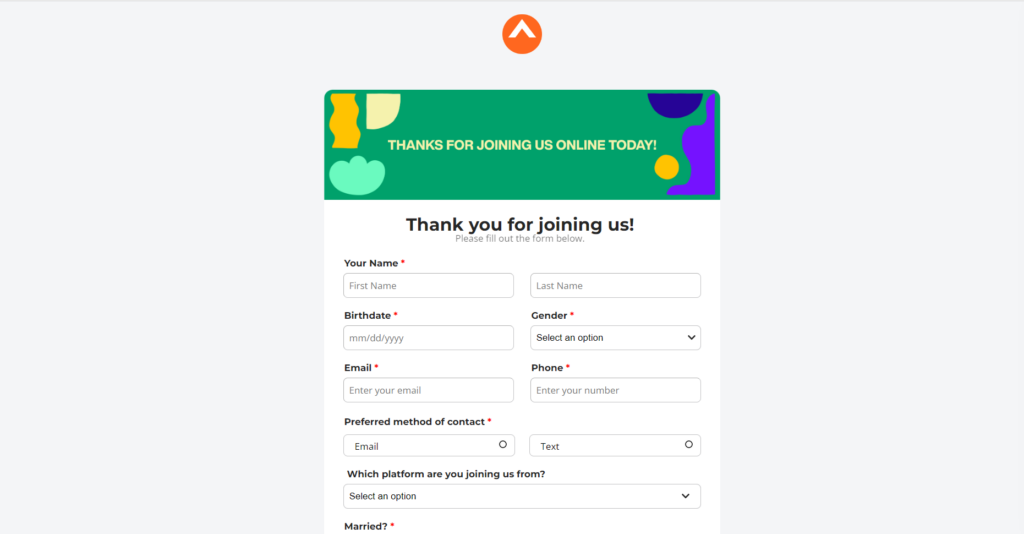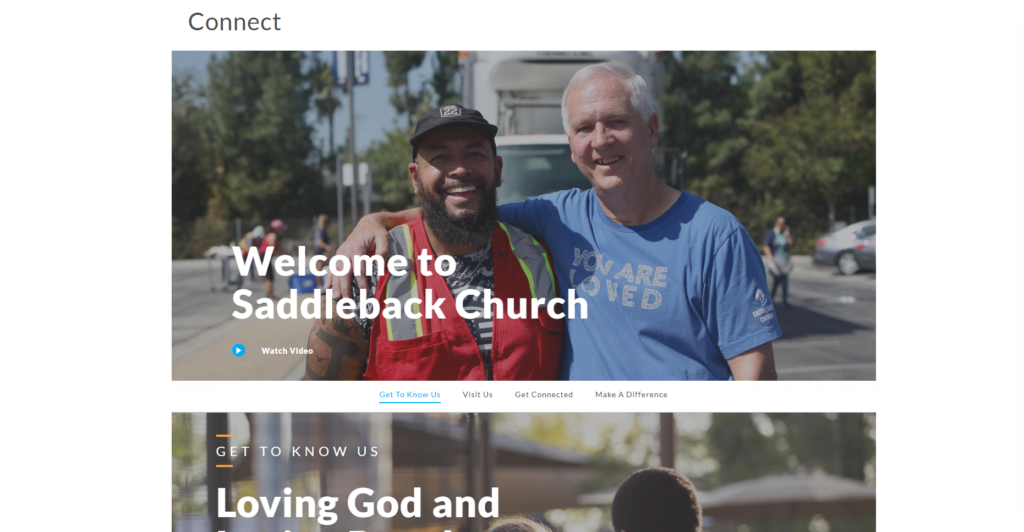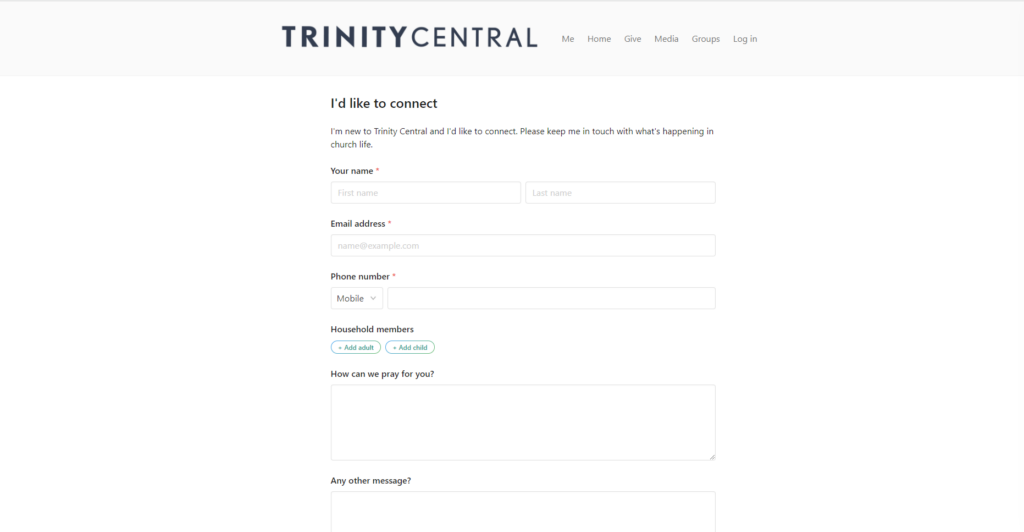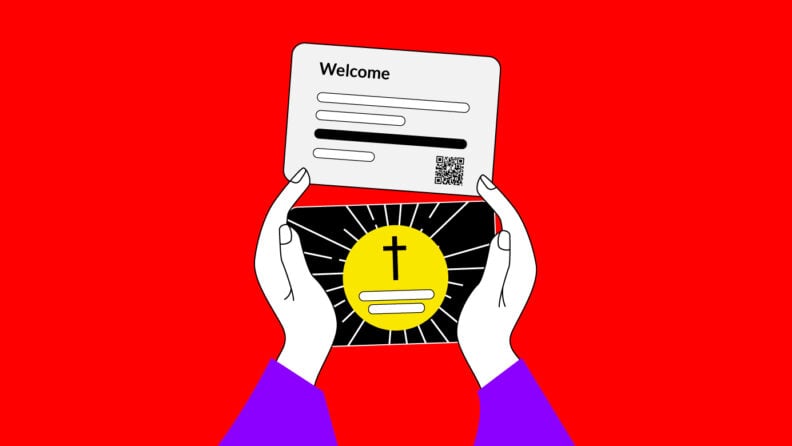Church connection cards are just one tool in your church toolbox. While you might roll your eyes and think “do we still use these,” the reality is that this is an important tool to have in your church.
Whether the connect cards are handy little physical cards or an online form from a QR code, they provide visitors with an easy way to connect to your church, and also a great excuse for you to engage with and welcome visitors!
For some people, filling in a church connect card may be their initial interaction with a church or the first time they have reached out to connect with a local church.
They may have even made a momentous decision to follow Jesus or may be interested in attending upcoming church events, such as a baptism service or a welcome lunch!
Even though these cards may appear “dated,” don't discount the true fact that they do provide a great opportunity to connect.
Last year a study was released that highlighted the increase in regular church attendance, particularly among millennials. In 2021, only 17% of this age group reported regular attendance, but this number doubled in 2022, with 39% reporting regular attendance. Other age groups have also shown similar trends.
While this may result in more people attending a Sunday morning in the short term, it is still so crucial for your church to consider how to strategically engage these new attendees to ensure they stay involved for many years to come.
What Is A Church Connection Card?
A church connection card is a tool used to help new church attendees connect with your congregation. It’s typically a brief fill in form on a physical card or online. It provides fields for individuals to fill out basic contact information, such as their name, email address, physical address, and phone number.
This information can be used by your church to welcome and engage new visitors or new church members. Maybe they are requesting to be added to an email blast, or identifying a desire to volunteer. Either way, it's an easy way for them to communicate their requests.
It's also a great way for churches to respond with a personalized welcome to make them feel seen and valued, and an opportunity to show appreciation for their visit!
Additionally, connection cards can serve as a means to invite attendees to become official members of your church.
Whether called invite cards, connect cards, church welcome cards, or church visitor cards, they are an effective form of outreach and a great way to demonstrate that your congregation is invested in welcoming new members and helping them feel connected to all that your church has to offer.
How Are Church Connection Cards Used?
Well, let's face it, I think most of us have had that awkward moment when visiting a new church. Gail at the front door notices that you are a visiter, runs over with a big grin on her face and slips a card into your hand. She emphasizes how she would love for you to fill one in.
- NAME: You write it down, no problems there.
- PHONE NUMBER: You start to question yourself and think "Do I really want to give this church my cell number; what if they start phoning me!"
- EMAIL ADDRESS: Your heart begins to race and you think "What if they start spamming me with church newsletters and invites?"
- SPIRITUAL NEEDS AND PRAYER REQUESTS: You start to feel like you're being judged and forced to confess things. "Um, maybe I can just skip this?" you think to yourself.
All in all, filling in church connection cards can be a little awkward. But from the other side, we know the importance of these little gems. Also, knowing how awkward it is to fill it in, I think it's so important to think about how we use the information we receive, and also seriously consider what info we really need.
We need to think of the church connection cards being like the friendly introduction you get at a party—a way to break the ice and get to know each other better. Whether they are filling out a physical card or clicking around a digital form, we need to treat these cards as a way to connect with potential new family members.
And what happens next?
Well hopefully you have a great team or someone who is great with connecting with people that can reach out with a warm welcome. Keep them in the loop on upcoming events and programs and even match first time guests with other members who share similar interests. It's like making a new friend, but with less awkward small talk!
What To Include In A Church Connection Card
When you are trying to gather information from a new visitor, less is often more. The question is, how much info do you really need? Try to keep it as simple as possible and not request too much information.
If there appears to be too many questions to answer, it may intimidate the guest or they may feel too overwhelmed to fill in.
Remember that building a friendship or a relationship sometimes takes time. It's important to take things slow, to get to know each other, and build trust. The same goes for connecting with new visitors to your church. Don't overwhelm them with too many questions too soon; if they feel they are being interrogated, they may go running for the hills.
Remember, you can always follow up with them at another time to get more information. So don't panic if you only get their name and email address the first time. This is a great start, and you and your church leaders can make it your mission to learn more about them the following Sunday.
Your basic church connect card should include the standard contact information such as name, email address, and phone number. It will also be helpful to include a section for prayer requests or other questions a visitor may have.
Depending on how much space you have, it may also be beneficial to have a section for hobbies and interests. This can help connect visitors with certain church activities or ministries they may enjoy. Or even give you an opportunity to connect them with other church members who may enjoy the same interests.
The ultimate goal for your church is to make all visitors and regular attendees feel welcomed and connected to the church community, so keep the card friendly and easy to fill out.
What Size To Make Your Church Connection Card
When it comes to creating your own church connect card, size does matter. There's no “one-size-fits-all” answer. You want the card small enough to fit in a purse or pocket, but big enough to include all the necessary info.
Common sizes are 3.5 x 5 inches or 4 x 6 inches.
Church Connection Card Template
Download our church connection card template here, which is customizable so you can add your own church’s logo and information.
Examples Of Church Connection Cards
Here are some examples of digital connection cards and how some churches are using their connect cards though their own church website.
1. Elevation Church

2. Saddleback Church

3. Trinity Central Church

Tips For Using Church Connection Cards
- Follow up quickly: Once you receive a church connect card, make sure to follow up promptly within the next couple business days with a welcome message or email. This will show visitors that you care about their attendance and want to connect with them. That week, set a time to meet up in person, if they are interested!
- Keep the communication going: Regularly communicate with church visitors who have filled out a church connect card. If they are ok with it, send them church announcements; invitations to events, bible studies, and small groups; or even personalized notes to keep them engaged with your church community. If they wrote down a prayer request, let them know you are praying for their situation.
- Use the information for ministry opportunities: Use the information gathered from the church connect cards to identify potential volunteers or people who are interested in specific ministries and outreach. For example, if someone indicates an interest in working with youth, have a church leader reach out to them about volunteer opportunities in your church’s young adults.
- Analyze the data: Keep track of the information gathered from church connect cards and use it to analyze trends in your church's attendance and engagement. This can help you identify areas where your church may need improvement and better tailor your outreach efforts to visitors.
Remember, the information gathered from church connect cards is a valuable resource for connecting with visitors and building relationships within your church community. So make the most of it—these may be future church members!
What’s Next?
One final thought, and I apologize if I sound like a broken record, but I can't drive this point enough—I know it is not always easy to attract visitors to churches, and times can pass where it feels like it's been awhile since a visitor came through that door, so when they do come you want to make the best first impression possible and not let them slip away.
This is why the church connect card can be a simple and quick way to grab their contact information and make sure they feel seen and valued.
So have some fun, make that first move, and ask for their information! It's sure to be the beginning of a beautiful friendship!
Read more about ideas for welcoming people to your church here, and subscribe to The Lead Pastor newsletter for more on connection cards and growing your church.


